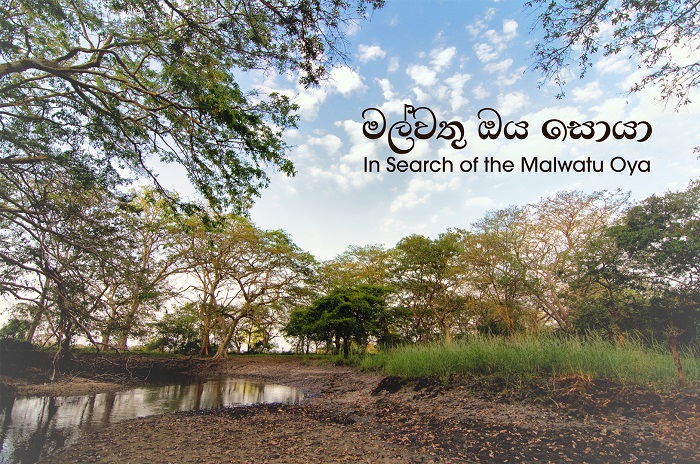
By Uditha Devapriya
The Malwatu Oya is the oldest and most important of the rivers in Sri Lanka. Its history is woven into the history of the country and its culture. Malwatu Oya Soya, in that respect, is a documentary not merely about the river, but the lives of the people and the society that it touched. Directed by one of Sri Lanka’s leading historians and intellectual voices, Malwatu Oya Soya made the rounds at several film festivals, in Pondicherry, Rome, and the Hague, winning awards and accolades at them all. It will have its first international screening on the 28th of this month at the India International Centre, in New Delhi.
From a diplomatic standpoint, it makes sense to use a country’s culture to engage with the rest of the world. Malwatu Oya Soya presents such an opportunity. Yet far from attracting the attention it deserves, it has gone virtually unnoticed in Sri Lanka. This is regrettable, not least because the project is a labour of love. It was done not for profit, but for pleasure, and as a work of art, incorporating Sri Lanka’s culture, modern and medieval, it is as exceptional a film of its kind as has ever been made here. I confess I did not see it on the big screen: the television is hardly a good substitute for the theatre. Yet that no one has seen it fit to screen it in Sri Lanka, for Sri Lankans, is a damning indictment on us all.
Sri Lanka has experimented with a number of avenues in its foreign relations. These include tea and tourism. And yet, with the collapse of the global economy, these avenues have been exhausted. Ceylon Tea no longer covets the attention it once did, and given the scale of the debt crisis in Sri Lanka, tourism is no longer a viable option. For too long, we have depended on the goodwill of other countries, doing next to nothing to build up our capabilities. The little we produce and export can no longer sustain us. We used to fill the gap by resorting to bilateral and multilateral debt, through partners like China and Western capital markets. We can no longer afford to indulge in them. As a nation, we are bankrupt.
Far from allowing ourselves to be crippled, we need to make use of these limitations, to turn them into opportunities. Sri Lanka has immense potential, and not merely as a maritime hub. Its position in the Indian Ocean has been described as strategic, and has always been highlighted. Yet its inability to tap into its own potential has been intriguing. What Sri Lanka should do now is to engage with the world anew, leaving behind the blunders of the past and forging new relationships and partnerships. To this end, it can make use of two avenues it has never considered before. The first is sports, the second culture.
A country’s politics is an acute reflection of its foreign policies. In that respect, the way Sri Lanka uses, or has failed to use, its own past reflects the way its politicians, officials, and people in general view its history. Abroad and at home, Sri Lankans talk of a 2,500-year-old civilisation and its contribution to world and regional history. Yet no one has delved well enough into that civilisation and history. Archaeological research is not what it used to be: it is underfunded, understaffed, and overworked. Archives and libraries look, and indeed are, starved for funds, though they fulfil a role in granting people access to their country’s past. The officials at these institutions are dedicated, and cooperative. Yet they are overwhelmed and underpaid. This has pushed these places far below their potential.
The Tourism Ministry talks about opening stalls abroad. This is to be welcomed. Yet a work of art like Malwatu Oya Soya can do more wonders, at a fraction of the cost which the State usually expends on tourism stalls. It can project Sri Lanka’s past and provide it a platform to cement its position, both in the region and the world. Popular writers, and even historians, spend their time hailing the purity of Sri Lanka’s ancient and medieval civilisation. But how many of them have grasped the historical complexity of that civilisation, and what it meant for the country and its people? Malwatu Oya Soya is hardly a Mahavamsist document about Sri Lanka’s history, but it charts a period in which Sri Lanka flourished as a maritime hub. Is this not something we can use to promote ourselves?
India is a case in point here. Following independence, its leaders understood the importance of anchoring the country in its past while charting a way to the future. It is to Nehru’s credit that the government patronised artists, scientists, and intellectuals. Nehru associated with a number of them personally and gave them freedom to launch India into the world. This led to the opening of art galleries, museums, libraries, and archives, not to mention universities. Modern India would have been nowhere without the ground-breaking work of historians like Romila Tharpar, artists like M. F. Husain, scientists like Homi Bhabha. They were deeply catholic in their tastes, and they cemented India’s position in the world. Sri Lanka’s colonial elite, by contrast, were too derivative to comprehend their own past, to use it as a launching pad to the future. To quote Dr Dayan Jayatilleka, we never had a Nehru.
Dr SinhaRaja Tammita-Delgoda, who directed Malwatu Oya Soya and is more or less the brains behind it, was blunt: “Sri Lanka one of the oldest living cultures in the world, yet it is often made to feel like a junior partner.” I would add to that: Sri Lanka has forced itself to become a junior partner. For this it has no one else but itself to blame. While other nations forge ahead, we remain far behind. In the guise of diplomacy, we have cowed down before powerful enemies and alienated faithful friends. Our failure to use our past as a diplomatic tool is hence not surprising: it is symptomatic of a bigger failure, of which we are all only too aware. As a country and a people, we clearly need to do more.
Uditha Devapriya is the Chief Analyst – International Relations at Factum and can be reached at uditha@factum.lk
Factum is an Asia Pacific-focused think tank on International Relations, Tech Cooperation and Strategic Communications accessible via www.factum.lk


